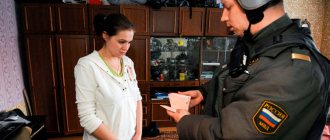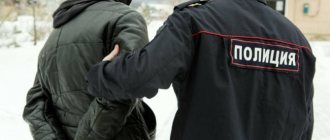Tweet
In judicial practice, it has become widespread to use as evidence of a defendant’s guilt the testimony of citizens interrogated as witnesses who were present as witnesses during certain investigative actions, this is especially widely used in cases of drug trafficking. Witnesses who were present during the inspection of the “purchaser”, the transfer of technical equipment to him, the receipt of narcotic drugs from him, during the seizure, search, etc., are already interrogated as witnesses during the preliminary investigation. Police officers who carried out operational search activities are being interrogated as witnesses. During the trial, investigators who interrogated the accused who admitted their guilt are questioned as witnesses. The testimony of such witnesses takes up most of the reasoning part of the verdict, while the protocols of investigative actions and operational-search activities themselves are not analyzed by the court or are not analyzed enough.
Petitions for the inadmissibility of evidence are not made by the defense, and the testimony of the above-mentioned witnesses, operational officers, and investigators questioned as witnesses at the request of the public prosecutor becomes independent evidence of the guilt of persons in committing crimes. Often there is a contrast between the protocols of investigative actions and operational-search activities and the testimony of these individuals.
State prosecutors in these cases believe that the testimony of all persons interrogated at their request as witnesses is evidence of the person’s guilt, referring to paragraph 2 of part 2 of Art. 74 of the Code of Criminal Procedure of the Russian Federation, according to which the testimony of witnesses is allowed as evidence, and often the courts agree with this.
Witness: who is this?
A witness is one of the participants in either administrative or criminal (and in some cases tax) proceedings.
Accordingly, regulatory legal acts that explain in detail the purpose, essence, rights and obligations of witnesses are the Criminal Procedure Code of Russia (Code of Criminal Procedure of the Russian Federation), the Code of Administrative Offenses (CAO RF), the Tax Code (TC RF), and also Federal Law of October 2, 2007 No. 229-FZ “On Enforcement Proceedings”
.
The very definition of a witness is contained only in the Code of Criminal Procedure of the Russian Federation
.
Article 60 of this act states that a witness is a person who is not personally interested in the outcome of the case, attracted by the inquiry officer or investigator to certify the fact of an investigative action, as well as the content, progress and results of the investigative action.
Let's translate this wording from legal language into Russian.
In essence, a witness is a random citizen who happens to be not far from the place where an investigative action is being conducted (for example, a search in a neighbor’s apartment or an identification parade).
This action does not concern him personally, he has no reason to hide any evidence or hide anything, he is an observer, an independent party.
The position of the Constitutional Court of the Russian Federation on this issue
The issue of the inadmissibility of replacing the interrogation protocol of an accused (suspect), recognized as inadmissible evidence, with the testimony of an investigator (interrogating officer) questioned as a witness, has now been clearly resolved by judicial practice.
Back in 2004, the Constitutional Court of the Russian Federation clarified that the provisions of Part 5 of Art. 246 and part 3 of Art. 278 of the Code of Criminal Procedure of the Russian Federation, allow the interrogation of the investigator as a witness regarding the circumstances of the conduct of certain investigative and other procedural actions.
However, these provisions must be applied in conjunction with other norms of the Code of Criminal Procedure of the Russian Federation. This relationship does not allow the court to question the investigator about the content of the testimony given during the investigation in order to restore the content of this testimony. Thus, the law, based on the provisions of Art. 50 of the Constitution of the Russian Federation, excludes the possibility of any, direct or indirect, use of the information contained therein.
Apparently, the issue of assessing the testimony of witnesses and operational officers should be resolved in a similar way.
Functions of a witness
This participant in judicial proceedings is needed in order to verify the correctness of the information about the investigative action that the investigator enters into the protocol.
He carefully observes all stages of this event (the same search), watches exactly how the operatives carry out this action, and then studies the protocol they compiled.
The protocol describes what exactly was done by the task force, when and where exactly, whether the desired item was found or not (if we are talking about a search).
The witness, having read this report and making sure that everything is correct, puts his signature.
His task is to confirm that government officials did not commit any violations (for example, that the bag of drugs was actually found and not planted by the police).
By the way, witnesses are brought in first of all during a search.
Until November 2014, traffic cops could very often need them.
They were involved in inspecting the car and conducting a medical examination of the driver.
Now, in these situations, video recording is sufficient.
The only case when a traffic cop can involve you as a witness is when conducting a personal search of the driver or passengers of a car.
When conducting investigative actions, one witness is not enough. There must be at least two of them.
Is it possible to refuse to be involved in a case as a witness? Yes, sure.
They can only ask you about this, ask for your consent, but no one can force you under any circumstances.
Participation of this kind is purely an act of good will, and you do not bear any responsibility for refusal.
Rights of a witness
The specific rights of a witness include:
- the right to participate in an investigative action (that is, a witness can be personally present at all stages of this action);
- the right to file complaints against the actions or inaction of the investigator and against any of his decisions that limit the rights of an attesting witness;
- the right to freely express any remarks, comments, statements that relate to the actions of the investigator and operatives (such comments are also recorded in the protocol, and the witness can do this personally);
- for compensation of all losses incurred (for example, travel expenses - if, of course, all tickets for public transport have been preserved);
- for reimbursement of that part of the salary that the witness did not receive due to the fact that during working hours he helped law enforcement officers (to exercise this right, you need to work officially, under an employment contract);
- to pay compensation for time spent and distraction from regular activities if the witness does not officially work. The amount of compensation is calculated on an individual basis.
In addition to specific rights, the witness is also endowed with rights that are common to all participants in the criminal process (witnesses, suspects, victims, etc.).
These rights include:
- the right to receive full information about your rights, duties and responsibilities;
- to use his native language or the one he speaks;
- the right to use professional interpreter services;
- not be subjected to any humiliation, moral or physical violence;
- file complaints against any actions and decisions of the investigator that limit his rights.
An attesting witness also has the rights of a participant in an investigative action.
He can:
- find out how and why a search, examination or other investigative action in which he participates is carried out;
- what technical means are used;
- be personally present during the entire procedure;
- read the protocol kept by the investigator;
- demand that any changes or additions be made to the protocol;
- sign the protocol, thereby agreeing that all its contents are true;
- do not sign the protocol, explaining why.
The witness can fully enjoy all the listed rights from these three large blocks, and no one has the right to prevent him from freely exercising them.
You will probably be interested in looking at the mental map “Actions if you lose your passport”, which explains in detail why you can be fined
Or HERE you will find out how to get SNILS
Who are the parties to the employment agreement:
What if they start interrogating?
Very often, law enforcement officers, taking advantage of the situation, the suddenness of what is happening and the illiteracy of our citizens, begin to interrogate employees, taking them to neighboring offices.
This is the time to remember your constitutional rights. The Constitution provides two articles for such a case, these are:
- in Russia, everyone is guaranteed the right to receive qualified legal assistance (Article 48 of the Constitution of the Russian Federation);
- no one is obliged to testify against himself, his spouse or close relatives (Article 51 of the Constitution of the Russian Federation).
The meaning is that a citizen can remain silent and not testify against himself. If your reluctance to testify, as well as your reluctance to answer questions, will cause questioning by the investigative authorities, then you can refer to your legal illiteracy and willingness to communicate only in the presence of your lawyer.
You need to remember that the less you say at the first communication, the easier it will be for you and your lawyer in the future.
Duties of a witness
If a person accepts the investigator’s invitation and receives the status of a witness, he is simultaneously given a number of responsibilities.
These include:
- the obligation to confirm the very fact of the investigative action (that is, to observe how it is carried out, carefully read the protocol and, if everything is correct, sign);
- to arrive when called by an investigator or to court;
- do not disclose the preliminary investigation data to anyone without permission (if the investigator has requested this from him in advance);
- comply with all other criminal procedural requirements.
There is one important point here that is very often ignored.
The fact is that a witness is a full-fledged participant in the criminal process. As mentioned above, he has not only rights, but also responsibilities.
This means that if you agree to participate as a witness, you will have to unquestioningly and conscientiously fulfill these duties.
That is, if the investigator calls you to court, you will need to appear, despite the fact that you are inconvenient, you have work or other matters.
If the investigator regularly invites you to visit his office to give testimony or provide some additional explanations, you also will not be able to refuse.
If the attesting witness ignores these calls, procedural coercive measures may be applied to him with good reason.
What does this mean? Nothing good - forced arrest (accompanied by bailiffs) or a fine.
And for telling anyone (except the investigator or interrogator) about what he saw and heard during the investigative action, a witness can be prosecuted under Article 310 of the Criminal Code.
Participation of witnesses in investigative actions as a guarantee of the reliability of the preliminary investigation
HOME > Return to contentsPolice and investigative activities
Correct link to the article:
Yarovenko V.V.
— Participation of witnesses in investigative actions as a guarantee of the reliability of the preliminary investigation // Police and investigative activities. – 2022. – No. 2. – P. 56 – 65. DOI: 10.25136/2409-7810.2018.2.26137 URL: https://nbpublish.com/library_read_article.php?id=26137 Yarovenko Vasily Vasilievich
Doctor of Law
Vladivostok State University of Economics and Service
690041, Russia, Primorsky Krai, Vladivostok, st. Gogolya, 41
Yarovenko Vasilii Vasil'evich
Doctor of Law
Vladivostok State University of Economics and Service,
690041, Russia, Primorskii krai, g. Vladivostok, st. Gogolya, 41
DOI:
10.25136/2409-7810.2018.2.26137
Date the article was sent to the editor:
26-04-2018
Publication date:
13-07-2018
Annotation:
The subject of this study is the interrogation of an attesting witness as a participant in investigative actions.
The article discusses the different opinions of scientists on the use of modern technical means of recording instead of the participation of witnesses. The author draws attention to the importance, from a practical point of view, of interrogating an attesting witness by the court as a witness as a guarantee of the reliability of the investigative action in terms of compliance with the requirements of the criminal procedure law. If video recording is used, opportunities for falsification also remain, but identifying them is much more difficult. The methodological basis of the study consists of: formal logical method, generalization and comparative legal methods, as well as analysis and synthesis of judicial practice. As a result of the study of scientific publications and materials of various criminal cases, the author comes to the conclusion that the interrogation of witnesses by the court is a guarantee of the reliability of investigative actions both for the accused and for investigators, interrogators, and operational officers. Existing technical means of recording are not a reliable guarantor of the reliability of evidence. Key words:
investigation, investigator, court, witness, investigative actions, evidence, interrogation, defense, recording, technical means
Abstract:
The subject of this research is the investigative interview of a witness as a participant of investigative proceeding. Yarovenko analyzes opinions of resarches on the use of modern technical means of recording instead of participation of witnesses. He focuses on the practical importance of an investigative interview of an individual recognized as a witness by the court and whether an investigative interview of a witness is the guarantee of the validity of a preliminary investigation in terms of requirements for the criminally-remedial law. The use of video recording still leaves a chance for falsification but creates more difficulty to discover them. The methodological basis of the research includes formal law method, generalisation, comparative law method, as well as analysis and synthesis of judicial practice. As a result of the analysis of investigations and criminal cases, the author concludes that an investigative inquiry of a witness is the guarantee of validity of investigation both for the accused and investigators, investigators and operations staff. Thus, the current technical means of recording cannot guarantee the validity of evidence.
Keywords:
protection, interrogation, evidence, investigative action, witness, court, investigation, consequence, fixation, technical means The current Criminal Procedure Code of the Russian Federation provides for the mandatory participation of witnesses during a search 182, seizure Part 3 of Art. 183, personal search art. 184, identification art. 193 in order to respect the rights of citizens. There are no difficulties in inviting witnesses in the above-mentioned actions, since they are not carried out in hard-to-reach, deserted areas, and their production is preceded by a preparatory stage, where the issue of the participation of witnesses is decided.
In the legal literature devoted to the problems of the participation of witnesses in investigative actions, there are opposing opinions [1]. So, A.V. Belousov writes that “the institution of witnesses provides an opportunity for the defense or other interested parties to manipulate the evidence collected in the case: to help “correct” memories of the investigative action, to influence through bribery or threats” [2, p. 103].
By the transition to the adversarial process, the institution of witnesses lost its relevance as a unique means of ensuring the unconditional reliability of evidence. Currently, the only measure of the reliability of facts is the free conviction of the judge, formulated during the analysis of evidence in court [3, p. 29-31]. It is difficult to agree with this, since the judge did not participate in the investigative action, he cannot objectively evaluate the evidence based on the content of the investigative action protocols, which can be falsified. To establish or refute falsification, the judge must interrogate the participants in the investigative action, in particular, witnesses.
An example of the above is the criminal case of S., convicted on March 9, 2011 by the Ulyanovsk Regional Court under Part 2 of Art. 303 of the Criminal Code of the Russian Federation. From the testimony of witnesses announced at the court hearing in accordance with Part 3 of Art. 281 of the Code of Criminal Procedure of the Russian Federation, it follows that on May 18, 2009, investigator S. invited them to the investigative action as witnesses. Before the start of the investigative action, the investigator explained to them their rights and responsibilities. Whether he explained to other participants in the investigative action the rights and obligations, the procedure for carrying out the investigative action, they did not see or hear, since they were at a considerable distance from the participants in the investigative action. In court, they insisted that S. had only one investigative action carried out, and no one gave him evidence in their presence. The investigative action began with the police officers blocking traffic on this section of the road, after which the investigator himself placed the cars on the roadway and photographed their location.
Under such circumstances, the court came to the reasonable conclusion that the investigator, acting contrary to the requirements of Art. 60, 194 of the Code of Criminal Procedure of the Russian Federation, did not provide the opportunity for witnesses present during on-site verification of testimony to perceive and record the progress and results of investigative actions.
The fact that the witnesses were questioned as witnesses before the verification of testimony on the spot, that is, until May 18, 2009, and their testimony is similar in the protocols of verification of testimony on the spot, does not affect the legal assessment of S.’s actions, since, without the investigative actions themselves, without listening to the testimony of the said witnesses, S., having drawn up protocols for checking the testimony on the spot with the above-mentioned witnesses, created new evidence.
From S.’s testimony it follows that on May 14, 2009, he conducted a confrontation between E. and D. E. came in advance and, at his request, he let him read the testimony, since he referred to the fact that he did not remember exactly what he said in interrogation By falsifying these protocols, S. created all the necessary conditions for bringing to criminal responsibility a obviously innocent person – D. [4].
The interrogation of witnesses makes it possible to confirm the reliability of investigative actions, the absence of physical pressure, falsification and official forgery on the part of operational officers, investigators, and interrogators. This is confirmed by judicial and investigative practice. Thus, on November 13, 2022, the Aksai District Court of the Rostov Region found P. guilty and convicted of illegal possession of narcotic drugs on a large scale. In the appeal, lawyer B. asks that the verdict be overturned and that his client be acquitted, since P. was illegally detained, the drug discovered during his search was planted on him, physical pressure was exerted by the operational officers, falsification and forgery were carried out .
The reliability of the testimony of the interrogated witnesses does not raise any doubts among the judicial panel, since they have no grounds for a slander, as well as an interest in the outcome of the case, the testimony of each is consistent with each other and complements each other, confirmed by written evidence in the criminal case, in particular, the protocol of personal inspection and seizure, the conclusion of a chemical examination carried out in the case, which determined the type of drug seized and its weight, protocols of other investigative and procedural actions, other written evidence, the contents of which are disclosed in detail in the verdict.
The witnesses confirmed in court the fact that a bag containing a white substance was discovered and confiscated from the defendant during a personal search. Both saw what was in the package seized from P.; after the inspection, everything seized was packed into bags with tags, which were signed by all the persons involved. At the same time, in the testimony of these witnesses there is no mention that P. stated any provocations on the part of the police officers, or the fact that the package that was seized from him was planted on him. The witnesses only recorded the fact that P. had a bag with a powdery substance in his pocket at the time of his inspection, which he did not dispute. They did not see the details of his arrest, as a result of which their testimony cannot confirm or refute P.’s arguments that the drug was planted on him
There are no objective grounds for considering the witnesses to be interested parties in the case. P.'s statements that the witnesses are acquaintances of the police officers do not contain sufficient grounds for such an assumption.
No data indicating that the police officers had a need to artificially create evidence of accusation against P., or provocation on their part by the appellate authority, was not presented. All statements in this regard are unsubstantiated and are not objectively confirmed by anything [5].
In accordance with Part 3 of Art. 170 of the Code of Criminal Procedure of the Russian Federation, the absence of witnesses can be compensated by the use of technical means of recording the progress and results of the investigative action. If it is impossible to use technical means during an investigative action, the investigator makes a corresponding entry in the protocol. Failure to comply with these rules indicates that the investigative protocol was drawn up in violation of the requirements of the criminal procedure law, and therefore the evidence recorded in it is unreliable and will be recognized as unacceptable [6, pp. 47-50].
The reliability of evidence is a qualitative characteristic of its content, which depends on the correct use of forensic means of detection, recording, seizure and research of sources of evidentiary information. The reliability of evidence is of a practical nature. The absence in the inspection protocol of a description of the individualizing features of the detected traces, as well as the means and methods for identifying and securing them, does not exclude the possibility of their substitution (conscious or unintentional) [7, p. 128].
Replacing attesting witnesses with technical means of recording the progress of an investigative action should not be in favor of the latter, since modern technical means make it possible to edit video images, stop video recording, in order to create a favorable picture of what was seen, for demonstrating this video recording at a court hearing [8]. The witness can subsequently be questioned in court as a witness to assess the investigative action in terms of compliance with the requirements of the criminal procedure law. In the case of video recording, there are much more opportunities for falsification [9]. Even when witnesses are involved and technical means of recording are used, the defense puts forward arguments about the falsification and unreliability of the results of the investigative action, in particular in cases of illegal drug trafficking. We are not talking about isolated facts, but about the common position of the defense party.
A typical example. The materials of the criminal case do not contain and the court of first instance did not obtain data on the presence in the actions of law enforcement officers of the artificial creation of evidence of the accusation, or their falsification.
The court's conclusion about the guilt of the convicted is based on the totality of evidence examined at the trial. From the protocol of the personal inspection of things in F.’s possession, it follows that two witnesses took part in this procedural action, photographs were taken, the results of the inspection were recorded in the protocol and a photo table to it, according to which, including F. 25 transparent bags with a powdery substance and a telephone were found, for inspection of which F. gave written consent. Consequently, the arguments in the appeal of the convicted F. about the dubious ownership of his cell phone cannot be considered justified [10].
According to A.N. Watchdog, in problematic situations, it is possible to recreate the situation of an investigative action, check the circumstances established during it, without the help of witnesses, since almost all investigative actions are carried out with the participation of specialists, detectives, lawyers, and are also recorded using technical means. At the request of the accused, suspect and other participants in criminal proceedings, investigative actions can be carried out without the participation of witnesses if a representative of the defense (lawyer) participates in them [11].
The lawyer protects the interests of the accused by identifying both mistakes and violations committed by the investigator and violations during the conduct of investigative actions. In some criminal cases, due to the absence of a lawyer during the investigative action, the reliability of the evidence is called into question. The interrogation of an attesting witness allows you to establish the reason for the absence of a defense lawyer. Thus, in a criminal case, an inspection of the scene of the incident on July 25, 2016 was carried out in accordance with the requirements of the Code of Criminal Procedure of the Russian Federation, with the participation of witnesses and the accused Ch. However, the mandatory participation of a lawyer when performing this investigative action is not provided for by law. Moreover, as follows from the testimony of witnesses, before the start of the examination, the investigator explained the rights of all participants in the investigative action, while Ch. explained that he was taking part in it voluntarily and did not need the services of a defense lawyer [12].
Thus, interrogation of a witness is a way to protect the investigator from unfounded statements on the part of the accused and his defense attorney about interest in the outcome of the case, about falsification, about the fact of planting a package seized from him, for example, about the absence of a lawyer (defender). The witness confirms the content, progress and results of the investigative action, its impartiality and objectivity of the proceedings, guaranteeing the rights and legitimate interests of participants in the criminal process [8].
N.N. Zagvozdkina believes that if extras take part in an identification parade, they can subsequently be questioned as witnesses. Under such circumstances, the presence of witnesses looks like an unjustified excess [13, p. 60]. In a number of cases, the identification function of witnesses can be successfully performed by persons completely independent of law enforcement agencies, for example, the defense attorney of the accused, a doctor (forensic expert) when examining a corpse, extras during identification, etc. [3, p. 29-31].
An analysis of judicial practice has shown that interrogation of witnesses in court often occurs in order to verify the reliability of the factual data recorded in the investigative protocol and the circumstances that occurred in reality. The courts are guided by Part 8 of Art. 234 of the Code of Criminal Procedure of the Russian Federation, according to which, at the request of a party, any person who knows anything about the circumstances of investigative actions or the seizure and inclusion of documents in a criminal case can be questioned as a witness. Interrogation of extras is not widespread in practice. This is confirmed by the materials of a specific criminal case.
The lawyer defending the interests of the convicted person in the appeal pointed out that all investigative actions carried out during the preliminary investigation - confrontations, presentation of a person for identification are unacceptable evidence. Thus, during the identification parade on May 16, 2012, the attesting witness did not take part in it. The lawyer filed a motion to question additional witnesses: extras who participated in the investigative action.
The court verified the lawyers' arguments that the witness did not take part as a witness during the identification parade, but they were not confirmed. The identification was carried out in the presence of witnesses, who, before the identification began, were explained their rights and obligations under Art. 60 Code of Criminal Procedure of the Russian Federation. They were warned about criminal liability for giving knowingly false testimony and for refusing to give testimony under Art. 307, Art. 308 of the Criminal Code of the Russian Federation. The identification protocols indicate the conditions, the results of the identification and the explanations of the identifier. An entry was made in the identification report that the accused refused to sign. The refusal to sign is certified by witnesses.
In addition, at the hearing of the appellate court, at the request of the prosecutor, the testimony of witnesses who gave during the preliminary investigation was examined. From these testimonies it follows that they took part as witnesses during the identification parade; the defendant refused to sign the identification protocol.
The lawyer's arguments that during the trial the extras who took part in the identification, that is, additional witnesses, were not questioned, also do not constitute grounds for overturning the verdict. The identification protocols were assessed by the court in conjunction with other evidence, and the fact that the victim was struck multiple times with his hands and feet on various parts of the body, as well as with a bat on various parts of the body, is confirmed by a sufficient body of other evidence, which the court gave a proper assessment[14].
Questioning an attesting witness as a witness about the circumstances of investigative actions or the seizure and inclusion of documents in a criminal case serves as a guarantee against the use by the investigator of illegal methods and techniques during their production [9, 15]. We believe that it is also important that this is a guarantee for the investigator against unfounded accusations of illegal actions on the part of the defense.
Let us consider the most typical situations of judicial investigative practice, confirming the need to preserve the institution of witnesses, and their interrogation as witnesses.
From the standpoint of reliability, the question of whether the attesting witness has knowledge in jurisprudence is of interest. A. Mikhailov noted that if the witness does not have legal knowledge, then he cannot judge whether the procedural action was performed without violations of the criminal procedure law [3, p. 29-30]. A witness is called to certify the fact of the investigative action, its progress and results (Part 1, p. 170 of the Code of Criminal Procedure of the Russian Federation). For this participation, it is not required that the witness be a specialist in jurisprudence; he is not charged with the obligation to confirm the correctness of the investigative action. Witnesses are impartial witnesses to the legality of the actions of the investigator in situations where the investigation is opposed by refusing to comply with the legal demands or proposals of the investigator, resisting or disobeying. The task of witnesses is to confirm the legality of the actions of the investigator (inquiry officer) and the presence or absence of opposition to the investigation [16].
Thus, the appellate court of the Krasnoyarsk Regional Court considered in a court hearing the case of S., who was convicted of illegal possession without the purpose of selling a narcotic drug on a large scale. The defense filed a motion regarding the inadmissibility of using witnesses as witnesses. These witnesses were directly questioned at the court hearing, including in the presence of S. himself, who did not deny the fact of his personal search. They testified that they took part as witnesses in the personal search of S., during which a bag of substance was removed from his right trouser pocket. Based on the results, police officers drew up a report, where they signed it. The court did not establish any contradictions in the testimony of witnesses indicating their unreliability, and the court of appeal did not see any.
At the same time, the appellate court indicated that the duties of these persons included certification of the fact of the personal search of S., its progress and results and, accordingly, the defense’s arguments about improper monitoring of the personal search cannot be taken into account, including when absence of objective information about any interest of these witnesses [17].
In investigative practice, there are situations when the accused denies the authenticity of the investigative action protocol and insists on conducting a confrontation with witnesses who were present during the investigative action. According to the provisions of Art. 192 of the Code of Criminal Procedure of the Russian Federation, a confrontation is possible if there are significant contradictions in the testimony of previously interrogated persons. Conducting a confrontation is the right, and not the obligation, of the investigator, who resolves this issue taking into account the materials of the case.
For example, on January 17, 2022, the Judicial Collegium for Criminal Cases of the Tula Regional Court considered at a court hearing the appeal of lawyer P. in defense of the convicted P. against the verdict of the Sovetsky District Court of Tula dated October 31, 2022. Those questioned as witnesses and witnesses who participated in the search explained the circumstances of the investigative action carried out with their participation. All seized items and substances were packaged and sealed, signed by all persons involved. The witnesses confirmed their testimony during confrontations with P. [18].
In some cases, the reliability of investigative actions is called into question due to the incorrect time and date indicated in the protocol, due to non-compliance with the protocol form. Thus, witness G., an attesting witness during the investigative action, explained at the court hearing about explaining to the attesting witnesses their rights. The results of the investigative action are certified by the signatures of witnesses. The absence in the protocol of time (hours and minutes) for carrying out the investigative action (not provided for in the protocol form) does not affect the inadmissibility of the results of the investigative action (that is, the evidence) and their content. The court assessed the technical shortcomings of the protocol [19].
The Criminal Procedure Code of the Russian Federation does not provide for a mandatory form of protocol for investigative (procedural) actions. The procedural form is not subject to verification; problems that arise can be eliminated by questioning witnesses. The Judicial Collegium of the Rostov Regional Court in M.’s case noted that the content of the protocol fully corresponds to the events that actually took place, it lists all the persons involved and the items seized, which is confirmed by the testimony of witnesses. The provisions of the Code of Criminal Procedure of the Russian Federation do not contain mandatory requirements for the form of the above protocol. This protocol meets all the requirements of Art. Art. 74 and 75 of the Code of Criminal Procedure of the Russian Federation, from the point of view of relevance, admissibility and reliability . The signatures on the tags belong to the investigator and the witnesses. The witnesses questioned at the trial confirmed the investigator's testimony. The court did not find any violations of the packaging or signs of unauthorized opening of this narcotic drug [20].
Interesting in this regard are the materials of the criminal case against S., whose defense is that the investigator brought ready-made protocols, read them, and the witnesses signed them; this is illegal. The requirements of Article 158 of the Code of Criminal Procedure of the Russian Federation, which regulates the procedure for questioning witnesses, were violated. With such a collection of evidence, any testimony from prosecution witnesses could appear in the criminal case materials.
Witnesses explained in court that the investigator came to their place of residence with pre-prepared interrogation protocols. The investigator questioned at the court hearing answered questions from the defense and explained that she had already prepared and printed the protocols for the interrogation of witnesses in the office of the police department. At the witnesses' house, she gave them these protocols to read, and if there was something wrong, she would go to the department and retype the protocols.
Article 158 of the Code of Criminal Procedure of the Russian Federation, which the defense refers to in the complaint, regulates issues aimed at completing the preliminary investigation, and not the procedure for questioning witnesses. It is also impossible to agree with the arguments of the defense that the protocols of interrogation of witnesses during the preliminary investigation were falsified . As follows from the materials of the criminal case, the court of first instance established that the protocols of interrogations of witnesses do not contain signs of falsification, since at the court hearing the witnesses fully confirmed the testimony that they had given earlier, that is, the actual circumstances of their participation in the search. In turn, the fact that they were not interrogated at the location of the body conducting the investigation cannot serve as a basis for excluding these protocols from the evidence in the case, since Part 1 of Article 187 of the Code of Criminal Procedure of the Russian Federation allows for the possibility of an investigator conducting an interrogation at the location the person being interrogated. The fact that the investigator prepared drafts of the protocol in advance does not exclude their admissibility as evidence, since the circumstances of the participation of witnesses and the discovery of cash and drugs during the search as set out in the protocol corresponded to the actual circumstances, which the witnesses confirmed at the court hearing [21].
Thus, judicial practice confirms the need to use in controversial situations the testimony of witnesses as a guarantee of the reliability of the investigative actions carried out with their participation. According to the rules of Part 8 of Art. 234 of the Code of Criminal Procedure of the Russian Federation, at the request of a party, any person who knows anything about the circumstances of the investigative actions or the seizure and inclusion of documents in the criminal case may be questioned as a witness. There is no doubt that the interrogation of witnesses in court cannot be inferior in importance to the analysis of the reliability of the investigative actions carried out with technical means of recording.
Bibliography
| Other publications by this author |
| . | Yarovenko, V.V.. Participation of witnesses in investigative actions // Law and Politics. – 2016. – No. 6. – P.746-753. DOI: 10.7256/1811-9018.2016.6.19390 // https://printed.e-notabene.ru/author_letters.php |
| . | Belousov, A.V. On the need for changes in the institution of witnesses // Prosecutor's and investigative practice. Body of prosecutors general of the CIS countries. – M., 2000. – No. 3-4. – P. 103. (date of access: 04/24/2018). |
| . | Mikhailov, A. The institution of witnesses is an archaism of Russian criminal proceedings // Legality. – 2003. – No. |
| . | – pp. 29-31. https://www.lawmix.ru/comm/4134 (date of access: 04/24/2018). 4. Cassation Ruling of the Judicial Board in case No. 80-O11-7. Supreme Court of the Russian Federation. https://www.zakonrf.info/suddoc/68a2ed38a435b30efda1fd9b78dc08ba (access date: 04/24/2018). |
| . | Appeal ruling in case No. 22–992/2018. Rostov regional court. Rostov region // https://rospravosudie.com/court-rostovskij-oblastnoj-sud-rostovskaya-oblast-s/act-580897440 (date of access: 04/24/2018). |
| . | Yarovenko, V.V. Technical and forensic support for recording the progress and results of investigative actions // Collection of scientific papers SWorld. – Issue 3. Volume 32. – Odessa: KUPRIENKO SV, 2013. – P. 47-50. |
| . | Exarchopulo, A.A. Special knowledge and its application in the study of criminal case materials. – St. Petersburg: St. Petersburg Publishing House. state University, 2005. – P. 128. |
| . | Fransiforov, Yu.V. Retrospective analysis of the participation of witnesses in criminal proceedings // https://zakoniros.ru/?p=16522 (date of access: 04/24/2018). |
| . | Fomkin, N.N. The institution of witnesses in Russian criminal proceedings: to abolish or maintain? // Modern scientific research and innovation. 2012. No. 8 [Electronic resource]. URL: https://web.snauka.ru/issues/2012/08/16575 (date of access: 04/25/2018). |
| . | Appeal ruling in case 22-2799/2017. Astrakhan Regional Court. Astrakhan region // https://rospravosudie.com/court-astraxanskij-oblastnoj-sud-astraxanskaya-oblast-s/act-579724192 (date of access: 04/25/2018). |
| . | Storozheva, A.N. Witness in Russian criminal proceedings. Author's abstract. candidate diss. legal Sci. – Irkutsk, 2006 https://www.dissercat.com/content/ponyatoi-v-rossiiskom-ugolovnom-sudoproizvodstve#ixzz3drsIj8sk (date of access: 04/24/2018). |
| . | Appeal ruling in case 22-440/2017. Supreme Court of the Republic of Kalmykia. Republic of Kalmykia // https://rospravosudie.com/court-verxovnyj-sud-respubliki-kalmykiya-respublika-kalmykiya-s/act-565727263 (access date: 04/25/2018). |
| . | Zagvozdkin, N.N. On the participation of witnesses in Russian criminal proceedings // Far Eastern forensic readings. Vol. 4: Sat. scientific tr. – Vladivostok: Far Eastern Publishing House. University, 1999. – P. 60. |
| . | Appeal ruling in case 22-3500/2013. Judicial Collegium for Criminal Cases of the Kemerovo Regional Court. https://rospravosudie.com/court-kemerovskij-oblastnoj-sud-kemerovskaya-oblast-s/act-481193153 (date of access: 04/25/2018). |
| . | Yarovenko, V.V. Interrogation of a witness // All-Russian scientific and practical conference. Education, science and practice in activities to ensure the rights of citizens in the fight against crime" (November 12, 2015, Vladivostok) / Far Eastern Legal. Institute of the Ministry of Internal Affairs of Russia. – Khabarovsk: RIO DVUI Ministry of Internal Affairs of Russia, 2016. – P.248. |
| . | Kalugin, A. Witness in criminal proceedings // Russian justice. 1998. – No. 10. pp. 11–12. https://www.lawmix.ru/comm/4134 (date of access: 04/24/2018). |
| . | Appeal ruling in case 22-7239/2017. Krasnoyarsk Regional Court. Krasnoyarsk region. https://rospravosudie.com/court-krasnoyarskij-kraevoj-sud-krasnoyarskij-kraj-s/act-561263805 (date of access: 04/24/2018). |
| . | Appeal Ruling in the case 22-30/2018 (22-2833/2017) Tula Regional Court https://rospravosudie.com/court-tulskij-oblastnoj-sud-tulskaya-oblast-s/act-580069001 (date of appeal: 24.04. 2018). |
| . | Cassation Ruling of the Judicial Board in case No. 14-O10-44. Supreme Court of the Russian Federation // https://www.lawmix.ru/jude/3281 (date of access: 04/24/2018). |
| . | Appeal judgment in case 22-6093/2017. Rostov regional court. Rostov region // https://rospravosudie.com/court-rostovskij-oblastnoj-sud-rostovskaya-oblast-s/act-560611527 (date of access: 04/24/2018). |
| . | Appeal Ruling in case 22-6054/2017 (26.10.2017, Rostov Regional Court. Rostov Region // https://rospravosudie.com/court-rostovskij-oblastnoj-sud-rostovskaya-oblast-s/act-560516224 (date of appeal : 04/24/2018). |
Link to this article
Simply highlight and copy the link to this article to your clipboard. You can also try to find similar articles
Tweet
Who can and who cannot be understood?
Almost any citizen can become a witness.
The exceptions are minors, participants in criminal proceedings (and their relatives and friends), as well as police officers, detectives and all those who have the right to carry out operational investigative activities or engage in preliminary investigations.
If you are over 18 years old, have no relation to the executive authorities and are not personally interested in the outcome of the case, you will be accepted as a witness.
Witness and witness - what's the difference?
A witness is a person who knows some circumstances of a crime or offense because he personally saw and heard what was happening.
The witness observes not the crime, but the investigative action.
Absolutely anyone can be a witness.
In order to become a witness, it is enough to be, as they say, at the right time in the right place, there are no other grounds.
Such a person may be a minor, be related to the victim, or even have mental disabilities - but with all this, he will still retain the status of a witness.
Again, a person becomes a witness involuntarily (as a rule), and a witness - voluntarily.
Can a witness also be a witness at the same time?
Yes, despite the difference between these two statuses, sometimes they are combined in the same person.
For example, if during a search in the suspect’s apartment the investigators found something illegal (drugs, weapons), then the witness immediately becomes a witness.
From this moment on, he has the rights and responsibilities of a witness (according to the Criminal Code).
During the search
Before the search begins, the investigator is obliged to offer to voluntarily hand over the objects and documents to be seized that may be important for the criminal case. If they are issued voluntarily, the investigator has the right not to conduct a search. But you shouldn’t hope for the search to stop. Terminating a search is the investigator’s right, not his duty, and he is unlikely to use this right.
During a search, the investigator has the right to prohibit those present from leaving the premises, as well as from communicating with each other.
During a search, objects, documents and electronic media are confiscated. The seized items and documents must be described in the protocol. The seizure is carried out with the participation of a specialist; he must appear in the protocol. At the request of the legal owner in the presence of witnesses, information can be copied from the seized electronic media. But copying information may be refused.
All seized items and documents are presented to witnesses and other persons present during the search. If necessary, they are packaged and sealed at the search site.
When conducting a search, witnesses must be present, usually at least two people. Witnesses are persons not interested in the case. They are obliged to certify the fact, content and results of the actions during which they were present. If possible, invite your friends to participate as witnesses.
In most cases, employees of the organization are also present during the search. They are not participants in the search, but they participate in its production and can be included in the protocol.







